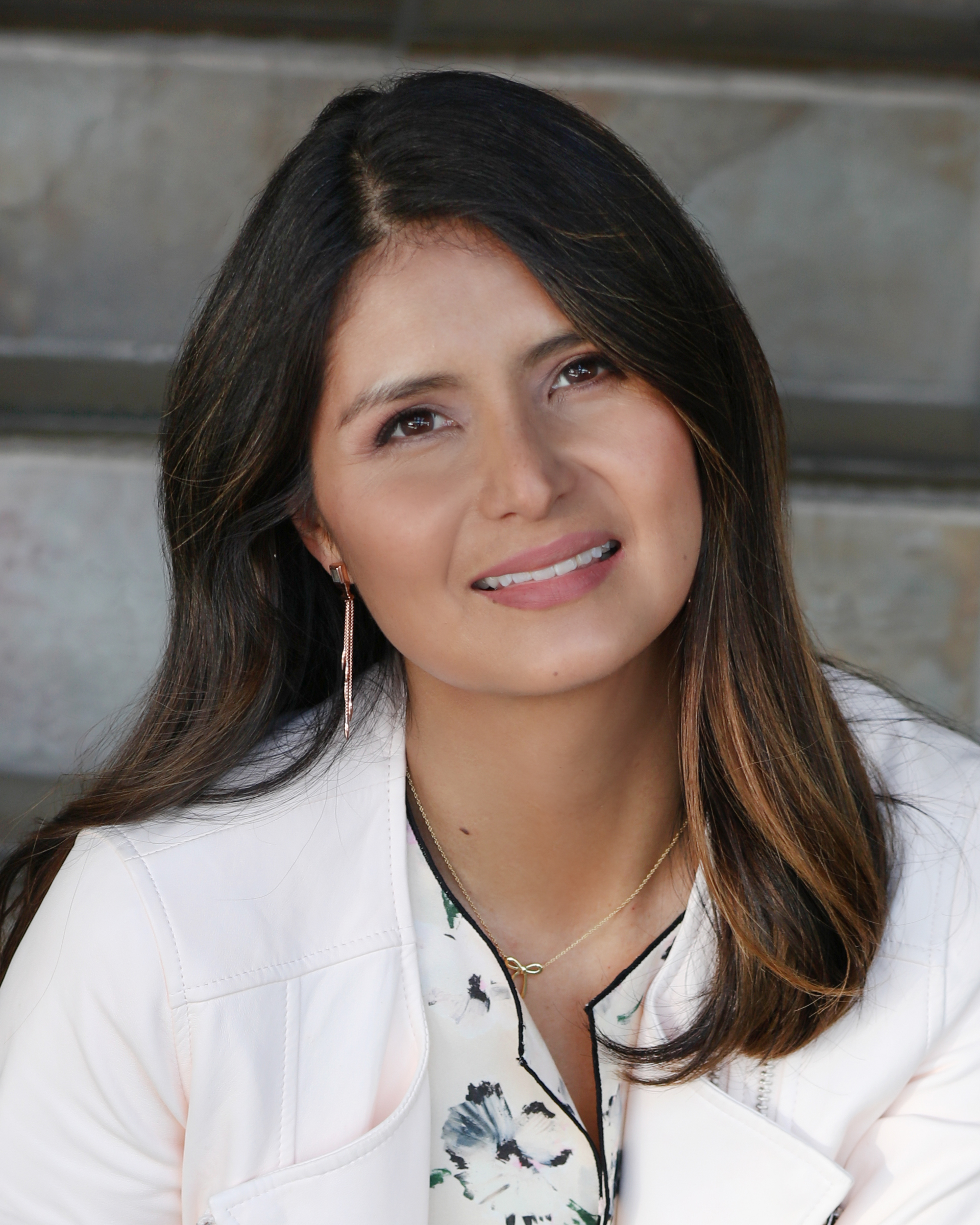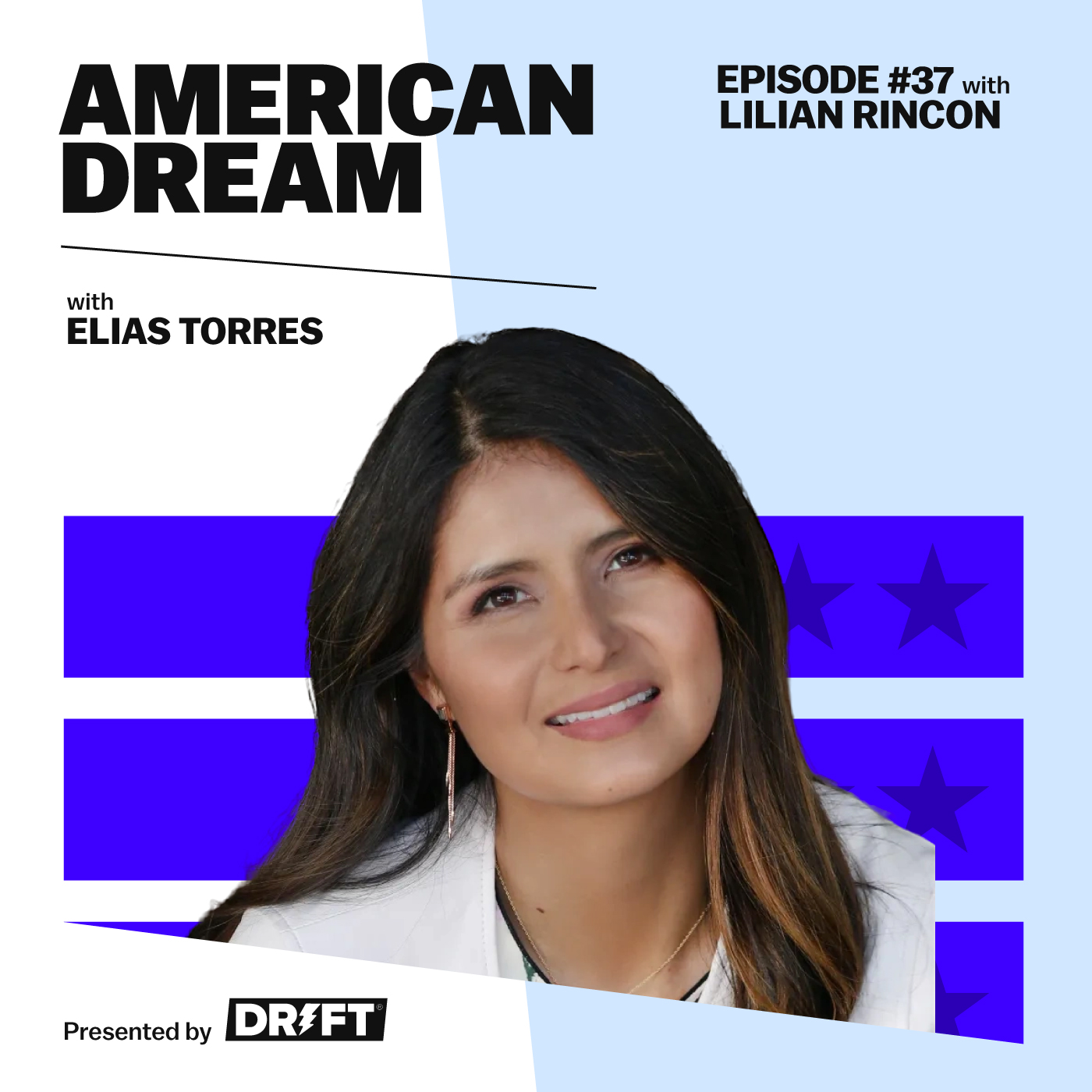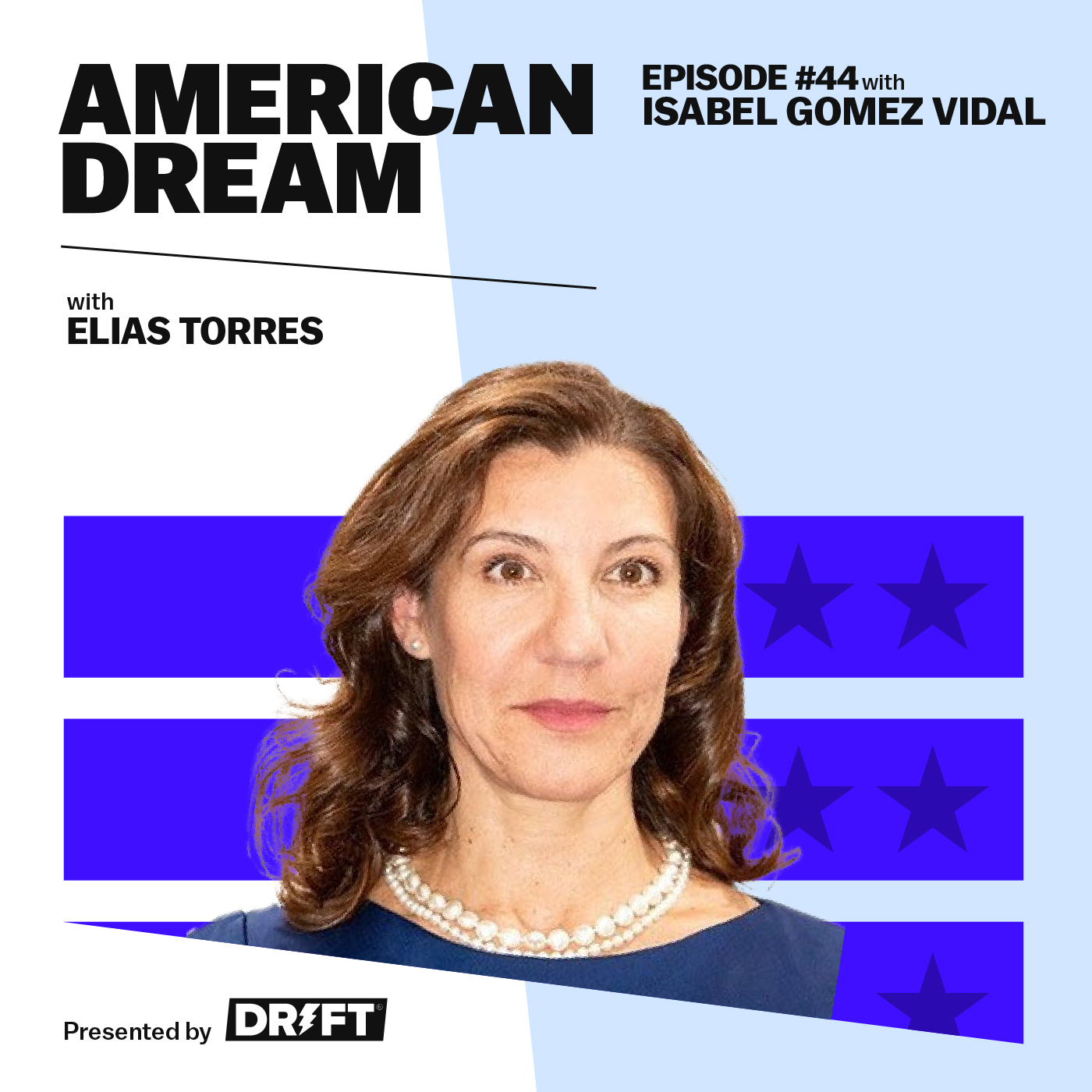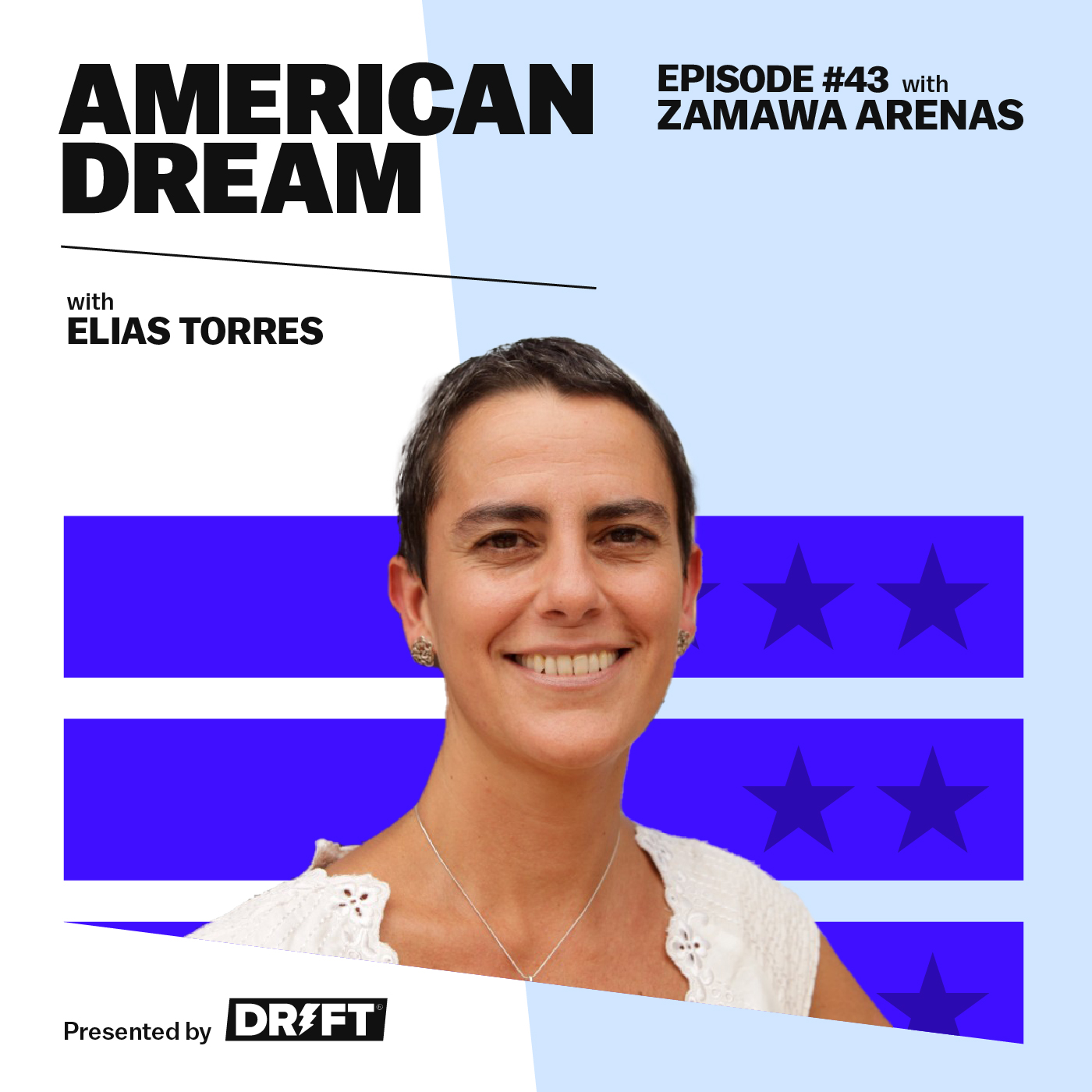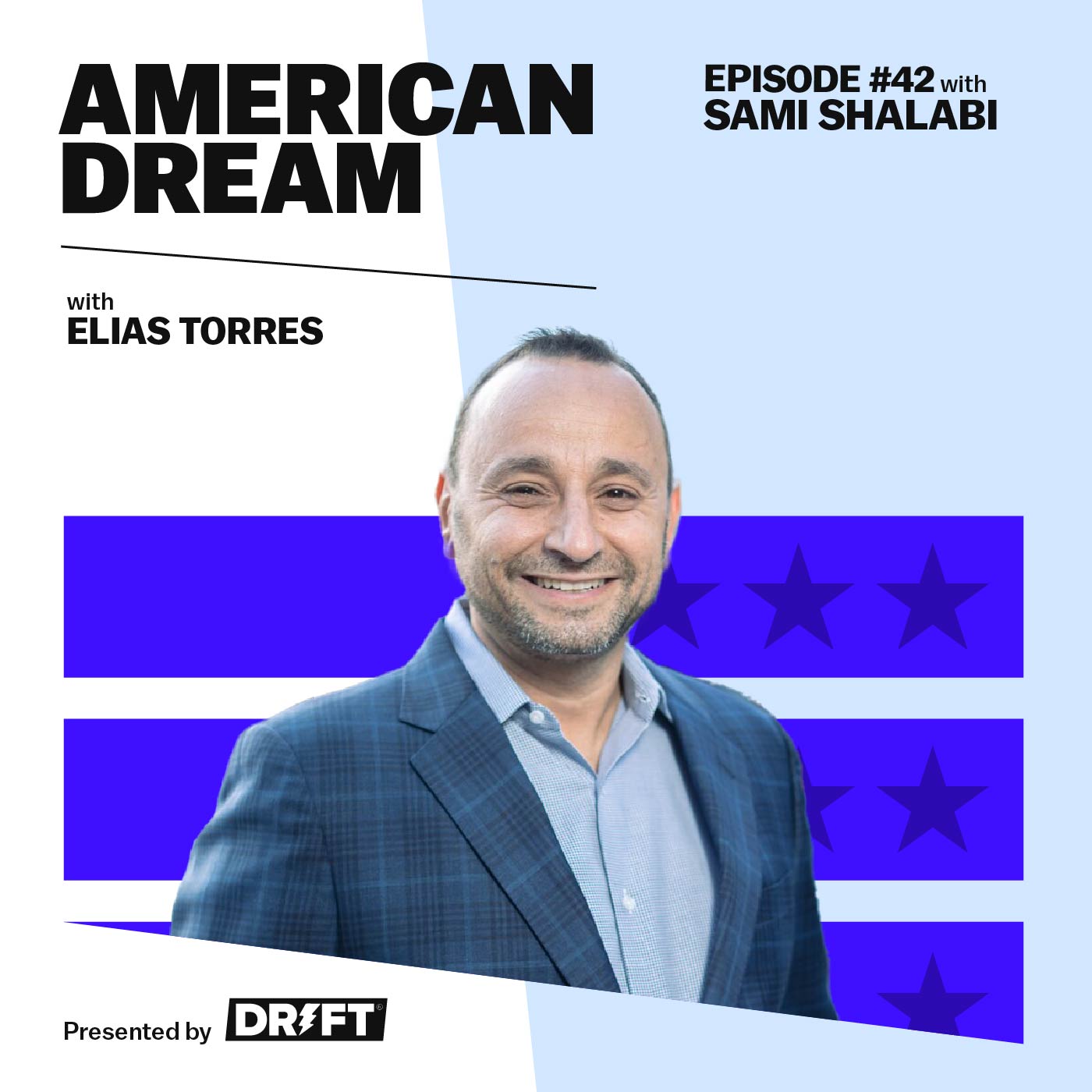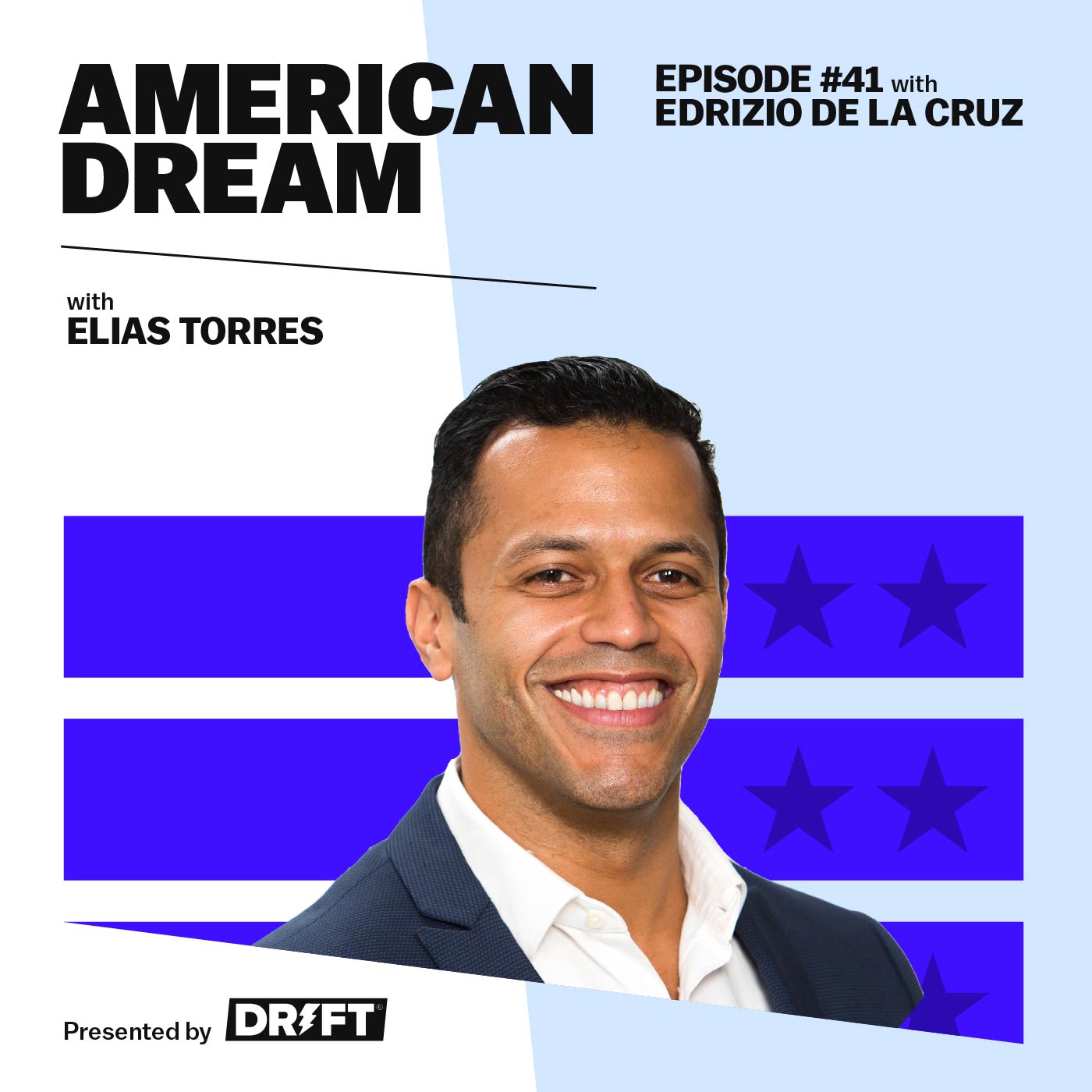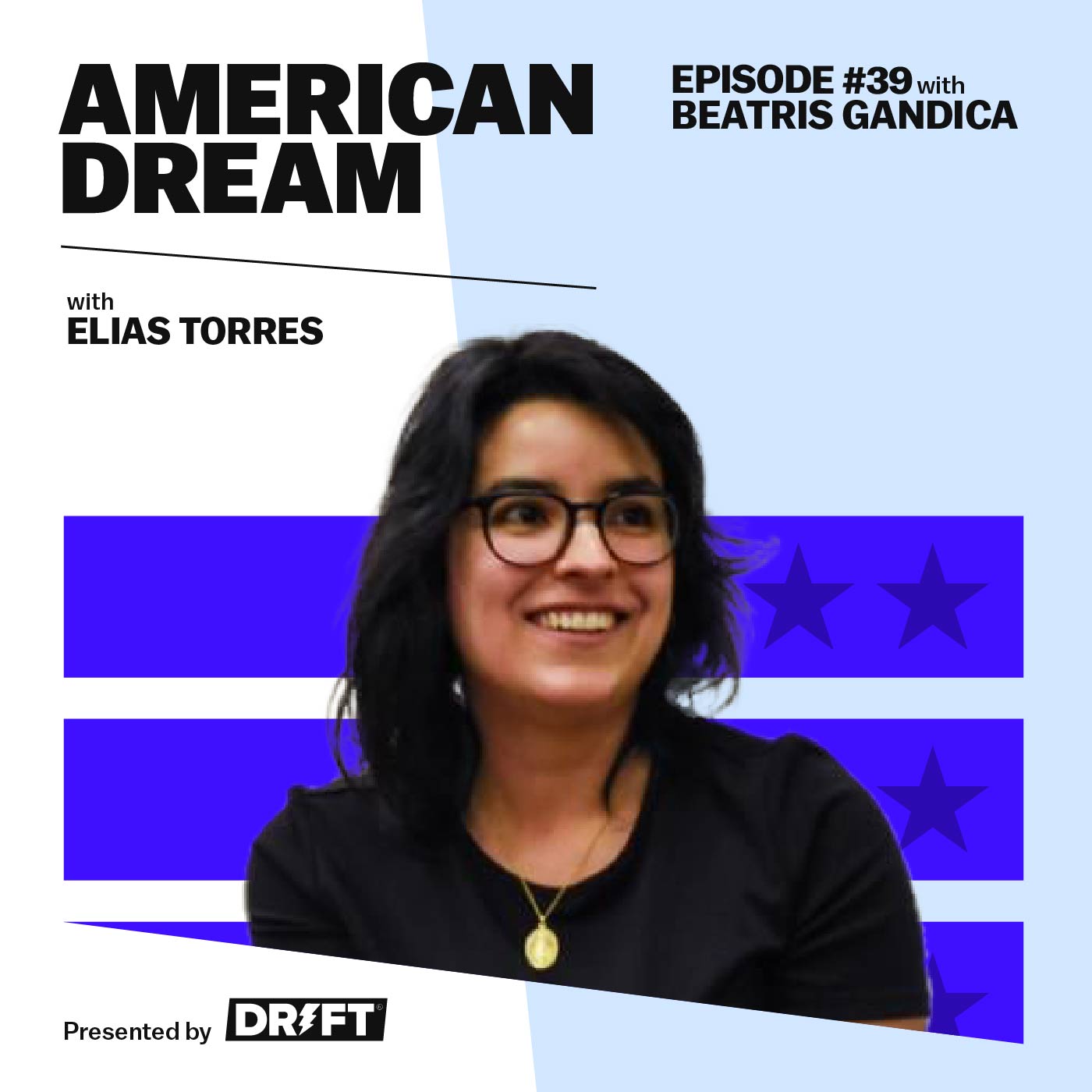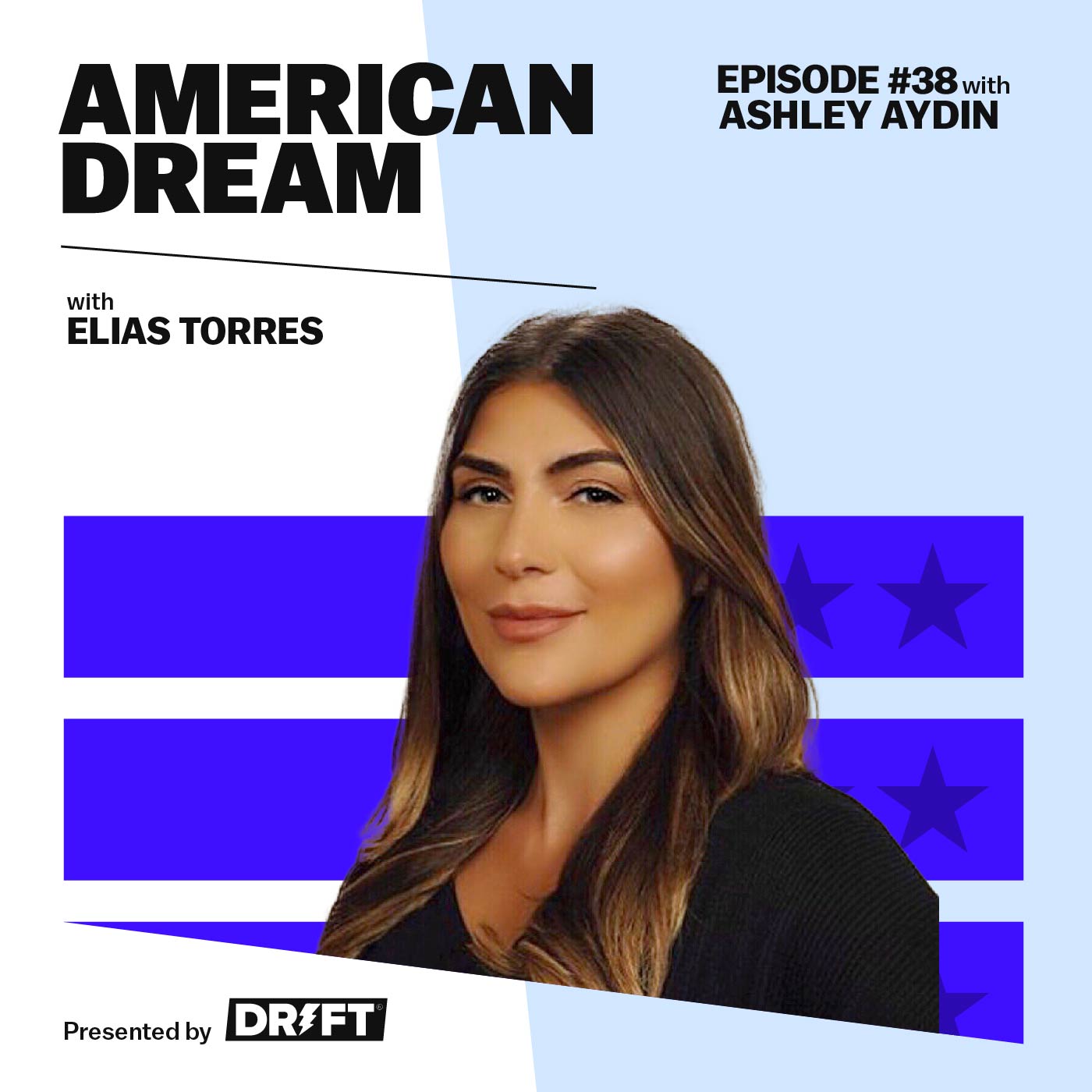Discover Your Passion and Dig for the Grit to Experience It (With Google's Lilian Rincon)
- 0.5
- 1
- 1.25
- 1.5
- 1.75
- 2
Elias Torres: inaudible. I'm Elias Torres, co- founder and CTO of Drift. You are listening to The American Dream Podcast. Did you know that Drift is part of just 2% of PC backed startups led by Latin American founders? Well, I'm on a mission to change that. On this show, you will hear from leaders who have achieved their own version of the American Dream. We'll talk about what the process looked like to get there, the obstacles they faced along the way, and the work we still have to do to build the new face of a diverse corporate America. foreign language to another episode of The American Dream Podcast. I am so excited to introduce today's guest, it's an honor, Lilian Rincon. Lilian is the Senior Director of Product Management at Google, which leads the consumer shopping team. If you ever use Google for your research, you type of product you're looking, and you see all this prices and products. That's what she works on. That's what she develops with her team together. Make sure that we always include the engineers with the product managers, because I know there's tension there. Lilian previously worked as product manager for Google Assistant, Skype, and Microsoft. Lilian first became interested in computer science when she moved from Venezuela to Canada at nine years old, not speaking any English and being the only Spanish speaking English as a second language student. Lilian loved math class because it's a universal language. Lilian's going to tell us about how her childhood experiences impacts the work she's focused on today. Let's get into it. Welcome, Lilian, to the show.
Lilian Rincon: Thank you so much. Well, so happy to be here and chatting with you.
Elias Torres: You immigrated, you left Venezuela at nine years old, English as a second language. This is a very familiar story. Tell me about Canada. How did it go there? Was it cold?
Lilian Rincon: It was definitely cold. It was definitely lonely. I had no family there. I remember honestly arriving in Vancouver and asking my mom and dad, " Where's all the people?" Because in Caracas where I was from, it was thousands of people everywhere all the time. And then in Canada everyone was inside. It felt like, anyways.
Elias Torres: Hopefully they were inside, right?
Lilian Rincon: Yeah.
Elias Torres: Oh yeah, it's true Latina.
Lilian Rincon: Yeah, I moved when I was nine. Maybe I can tell you a little bit about that. I moved when I was nine because I had grown up in Venezuela. This was during the'80s, so that'll tell you how old I am. There was a lot of turmoil. This is when the country, Hugo Chavez had a military coup. There was a lot going on in the country at the time. My parents had the foresight to realize that maybe it wouldn't have been best for me and for my education, and so they applied to get a visa. It took a few years. I think they realized this when I was four or five, and when I was nine actually we moved. I remember because I'll never forget this, it was a year where there was indeed a military coup, and the country was in a state of emergency. We got up really early. It's like out of a movie. I remember my parents having money because if they needed to pay off the army to be able to make it to the airport, you know, you needed to figure it out. And luckily we made the flight. That's when I left, and then I arrived in Vancouver. By the way, I normally vacation in Miami actually, like most people that like to go to Disneyland and stuff, like so Disney World. And I remember always thinking that in the US and in other places they spoke Spanish. Because in Miami we would arrive in the airport, take the bus or the taxi, and everyone spoke Spanish. And got to Vancouver, and I was like, " Oh my God, nobody speaks Spanish." So yeah, that was my journey. My journey to Vancouver was realizing I was the only Spanish speaking person in my school and trying to figure it out.
Elias Torres: I know the feeling really well except I did not have any money to get on the flight, because the army stopped me on my way out at Nicaragua. How long did you stay in Canada?
Lilian Rincon: I had this really, like many immigrant families, unique... Not a unique, I think it's a very common experience, of both my parents were engineers but they moved to Canada and they didn't have the same roles that they had. They left their senior positions. They spoke English, actually they met in England, but not the Canadian culture, et cetera. My dad, he struggled to keep his job. My mom was trying to find a job. It was a really hard time in the beginning. And so my first year I remember the family really having a hard time of a acclimating to the new way of life. So we moved again, actually. I don't know if I mentioned, but my mom is Chinese Indonesian, so we moved from Canada to Indonesia, tried to live there for six months, create a life there. That's when I went to school six days a week and I really appreciated not going to school six days a week when I moved back. But then that didn't work either. It was really hard. And so we moved again to Canada and then my dad, he still didn't want to let go of his country of course. And so he moved back and then we moved back to Venezuela, believe it or not. And then that didn't work either because it was still as violent as ever and not a good place, so we moved back to Canada. Anyways, it was just a really odd time, let's say, for a few years.
Elias Torres: Yeah, I hear you. I understand. I have Venezuelan friends right now, and one of my friends, their father, it's like, they bring him here and then he wants to go back. And he gets back on that plane right now, and it's hard to get back in here. But that is something very special, and I don't understand that when you're older how it's really hard to rip you from your identity and from the place where you were comfortable.
Lilian Rincon: For sure.
Elias Torres: Especially if you have done well. Compared to us that we are taken out earlier and we have nothing and we see nothing, and so we're more adaptable and flexible. We're willing to do whatever it takes wherever we are.
Lilian Rincon: Right, exactly.
Elias Torres: Yeah, no, it is difficult for them. But I thank them for the sacrifice that they made and they're trying to find a place and they give you the opportunity, right?
Lilian Rincon: Yeah. In hindsight, of course, right? Now that I have kids, I look back and I'm like, " The balls in some ways that my parents had to leave everything and start afresh," because people don't really think about that. But you leave everything and you have to start fresh and it's a huge sacrifice. Absolutely, yeah. Very thankful for my parents doing that.
Elias Torres: What do you tell your kids when they say, " Mom, why don't you buy me this? Or why don't we go to Disneyland?"
Lilian Rincon: It's funny actually, because my husband, he's full blown American and didn't grow up with the type of childhood it sounds like, Elias, you and I had. So we kind of have different perspectives on this. I tend to tell them all the stories, probably sound like the old lady of like, " I used to walk to school, and there was a period of my life where my stuff was in a container and I slept on the floor and I didn't have toys and I didn't get toys for many years." And my husband's the other extreme of, "I had a room full of toys and every kid should get 10 toys for Christmas." So we tend to have those conversations in our family.
Elias Torres: The conversation is like, " Can we just give them only one gift for Christmas?"
Lilian Rincon: Yeah. Exactly. Compromise.
Elias Torres: Can we tell all the family not to give them any gifts? Exactly. I hear you. I'm telling them stories and they don't get it. It's like, I had one bicycle growing up and I was so happy. I couldn't believe I got this bicycle. I don't know how my mom bought this bicycle at this point. And it was a used bicycle, obviously. It was not going to be a brand new one.
Lilian Rincon: I've been thinking a lot about this. I think we have to take them back and we have to spend the summer somewhere to actually see what life is like. Because I think as much as we can tell all these stories, it's hard to really feel it until you experience a little bit of it.
Elias Torres: Yeah. It's a age- old dilemma, right? Another good thing is that there are many people that we can help and inspire here in this country that are still going through a lot of that and similar. So that's what puts me to make this podcast and to share stories of people like you that are at the top of the game of working and building things in tech. Great jobs, great careers. And look where you came from and where you started and what you had to go through. So tell me about this quote of yours, " Perseverance with a passion." I saw an article.
Lilian Rincon: So actually I think I said that when I was doing a talk for this Latinas and Tech conference. I was telling the story actually of what happened after I got to Vancouver, and what happened after I realized I was the only Spanish speaking student in this ESL class. And to give you some color, this was in the early'90s where in Vancouver there was a lot of people from Hong Kong because of the'92 regulation change. Basically everyone spoke Cantonese and I was the only Spanish speaking person. It was very lonely. I remember kind of failing a test once because I didn't speak the language. I missed the instructions because I didn't understand them. And I got so upset, so angry. So there was this just fire that I felt in my belly out of sadness and anger at the situation. I took the matter into my own hands. I remember this because I stopped my pity party, and then I told my mom, " Okay, we're going to the supermarket." Because I had a dictionary, but a dictionary is so boring, and this is before anything that could actually teach you another language. So I said, " I need Archie comic books, and I'm going to use my cassette lyrics to teach myself the language with something that I enjoy." And honestly, that is actually how I ended up teaching myself English was just like, " Okay, just find something I like to read, and I'm going to translate every word and until I figure this out. And then I'm going to listen to cartoons and Madonna lyrics." Honestly, I remember, it's terrible, " Like A Prayer." Like, what does this mean? To me, that was such a critical moment in my life of showing myself that, " Hey man, when you just hit that rock bottom or whatever, you just figure it out. You find something that you love and find something that you enjoy, and you know you got to get it done, and you just get it done." You find a way to get it done in a funner way, let's say. Yeah.
Elias Torres: I love it. I love talking to my people. And Madonna, oh my God, that was so bad.
Lilian Rincon: Madonna and Debbie Gibson. That just tells you the year.
Elias Torres: I love it. No, I'm'76, so I've been there. The thing about it is, it's awesome. One of the things that I love, I don't know, I feel like I love independence and I love responsibility and I love caring. I got some stories of mine. I love whenever I was asked to rise to the challenge and to do that. It seems that you have. You've kind of been doing that since you were around age 15. Tell me more about that new identity, that new role that you've taken since that early age.
Lilian Rincon: Yeah. So I'm an only child, I guess I didn't mention that. And like I said, my parents were really struggling with living, figuring out their life in Canada. So during this time my dad was going back and forth to Venezuela. My mom was basically single mom with me because my dad was trying to figure things out in Venezuela. Then when I was 14, 15, around that age, my grandmother, my mom's mom, she had a stroke. My mom decided that she wanted to be with her mom. And in hindsight, I didn't know any better. I think at some years later I was like, " That was kind of a crazy thing to do." But my dad was in Venezuela, my mom had to go to Indonesia, so I had to figure it out. So they left me with a house. I didn't have my driver's license yet, and I had to figure it out. Like, how do you go to the grocery store? I did have a ATM card so I had some money so that's good. I didn't have to go figure out a job, too. But even just that whole thing of, how do you function without parents? How do you pay the bills? How do you go to the grocery store? How do you cook? Those basic things that I think growing up you take for granted because you have a parent, I kind of had to figure out really quickly. And during that time I think I learned a lot of things. One is, again, that you know can figure it out when you have to. But two, also, how to ask for help, honestly. At the time, the one thing that was consistent in my life was I played volleyball. I had my team and I had their parents, and I kind of had a extended family through friends that really, I think if it wasn't for them, I don't know if I would've gotten through high school.
Elias Torres: My story is similar. My mother had to go do a study in Sweden. She had an opportunity to do that, and I said, " You should go." She left us with my stepfather, but it didn't work out. I spent a year, 11 years old, and I took care of my brothers.
Lilian Rincon: Oh my God.
Elias Torres: I had my grandmother- in- law, she would help out. She lived nearby. But I love that. And so other kids would be right now demolished. I don't know, maybe I have mental problems in traumas, but I loved that opportunity because I learned so much. I had the key, I had a little budget, and I had to figure out food, how to cook, how to wash my clothes to go to school. I went to school. Imagine that? I did everything like an adult.
Lilian Rincon: Isn't that crazy? Yeah. Yeah, exactly. I have found a lot of people, actually, a lot of very amazing people at Google who have had similar experiences. So I wonder if it's in some way a weird experiment with some positive success of people who somehow figure it out earlier than college. So by the time you get to college, you're more mature. You know?
Elias Torres: Yeah. Like you said, it's just that maturity, because that's what life is. I mean, a lot of people in their 20s right now or 30s, they do not know how to support a home or how to support a family or how to hold a job and things like that, and how to solve complex problems. And so we are fortunate that we were ones that rose to it and were able to build on that, right?
Lilian Rincon: Yeah.
Elias Torres: It's funny, I was talking to a Sequoia partner about this, of like, how can Latinos make it into the eyes, into the visibility of Sequoia? Because Latinos sometimes think that it's just a, " Oh, you have to go to Stanford to be invested in Sequoia." And he talks about, he told me, " No. We love that you and David were outsiders and that you have this grit. We kind of like people that have the grit to overcome problems more than their pedigree. It's just hard to find it." And so that's what we want Latinos to go and tell them and tell other VCs, " We have that grit." And Latinos don't know that those things that we call hardships and stuff like that could be our biggest assets-
Lilian Rincon: Absolutely.
Elias Torres: ...and can work for you. That's awesome.
Lilian Rincon: I love that word, too. Because I think that is actually a good definition of what's the outcome is you develop that grit. You develop that ability to handle really tough situations and know that even if you don't know and you feel like it's a crisis, you'll figure it out.
Elias Torres: So how do you go from volleyball, 15, you're on your own, you're growing up quickly, and you end up at Microsoft. Give me a quick on that.
Lilian Rincon: Yeah. Well let's see. So somehow even after my parents left, continued with the math thing, really loved math. That was throughout my career. I actually went to university thinking I was going to be a doctor, because I was one of these kids that wanted to help others. I don't know, for whatever reason I wanted to be a doctor. My first year in college I decided that I couldn't play volleyball. I was playing on the volleyball team in college, and we were away so often, you know what I mean? Anyways, for better or for worse, I loved math. I didn't want to be in all these all day chemistry days, and I switched majors. So I switched to computing science. Computing science, for those of you that don't know, is mainly math. A lot of math, a lot of coding. Coding is fun. There are complex problems that you kind of have to solve versus memorizing. And to me, that's the thing that I enjoy the most. So anyways, I studied computing science, had a job lined up at a college. And then you remember the bubble burst in the early 2000s? So then I didn't have a job. So went through some turmoil there again. I thought I was top of my class or top female of my class, and then I didn't have a job. So then I applied for the Rhodes Scholarship. Made it pretty far. I didn't get it. So also again was devastated, like, " What am I going to do with my life?" And then ended up getting an engineering role in a company called Crystal Decisions in Vancouver. At the same time got accepted to do my PhD at University of Toronto. I remember flying out there with my dad actually, but having so much fun working, to be honest with you. Because at the time, I remember offshoring. I was traveling to India and to China and to Paris because we got acquired by a French company, and I was just loving work. So anyways, I ended up staying. I deferred my PhD and then got recruited by Microsoft to work as a program manager, product manager, let's say, in Redmond. So then I moved from Vancouver to Redmond because of that. But that was kind of the journey.
Elias Torres: Yeah. No, that's awesome. That's awesome. I love the parallels, and I think this is what we need to remind people of our failures. Because sometimes people get overwhelmed first, like, " How am I going to ever become anything?" Or, " Look at everything that is going wrong with me," or, " Not accepted to this, not accepted to other things."
Lilian Rincon: Yeah. And by the way, I will say, because I probably said that wrong. I applied to move to Redmond to move to Microsoft, by the way, because my boyfriend at the time was at Microsoft. And honestly I got rejected, I think, twice before I finally got in. So I also want to remind people that it's okay to fail. It's okay to try interviews or a crapshoot half the time. So you should never give up.
Elias Torres: Yeah, well if we're now speaking of our failures, I interviewed twice at Google and got rejected. I got rejected by Facebook, too. So that's why I decided to start companies. So I interviewed at Google earlier. I think what happens, I built some software when Gmail was launched, and I built a little hack to it. So Googlers reach out to me and says, " Wow, we want to hire you." And then from the interview process did not go anywhere. I'm sure I didn't know how to answer some flipping coins or something. And then I went to Harvard for a computer science and then Google was on site. So I thought, " Maybe now with the Harvard degree on computer science," and did not go well. Every time I get an email from a Google recruiter it's like, " Can we talk to you?" And I'm like, "Nah, don't worry. It's okay."
Lilian Rincon: So keep trying, Elias. That's the moral of the story is never give up. You've only tried twice.
Elias Torres: Exactly. Getting rejected by a company or something doesn't mean anything. You can try again multiple times. We got to encourage people to keep trying and one thing will work, and it'll be an amazing life that you'll have, and not give up. It happens to all of us. You're not there just because of that. So let's talk about, I'm a big fan, Bill Gates. Think week. What's think week?
Lilian Rincon: Yeah, so let's see. So I joined Microsoft and I was a junior PM. It was 2005 I think. Bill Gates was still CEO of Microsoft at the time. And not knowing left from right, I was a brand new PM. I decided to participate in this program. So Bill Gates would have these" think weeks" where basically anyone in the company could write a think week paper on any idea. You could be the president, you could be the most junior person, you could write a paper. He would have these technical assistants that would read all of these hundreds, thousands of papers. Then he might read one or two or a few, and if you were lucky, he would comment and fund it. So many actually products up to the time when I wrote the paper, I think, were kind of started that way at Microsoft. And so anyways, not knowing left from right, and having whatever confidence, I guess, and just having fun, I found something I was passionate about, which was at the time artists. I was working in display ads at the time, and I thought, " Hey, couldn't we create a marketplace, a self serve marketplace, so that smaller businesses could connect with artists to have better creative." So it was just a thesis, it was a hypothesis. I wrote this paper partnered with a great UXer who was also junior. We both created this paper. My GM liked it and I think he added his name on the paper; that helped. Then Bill Gates liked the paper and funded it. And honestly, that was sort of the bootstrap to my career at Microsoft. I got to actually build something like the thing I wrote about, it took about three years. But it became the asset management platform for at the time Ad Center, which was the self- service platform.
Elias Torres: What a story. That's awesome. It is. But doesn't he have a week that he disappears into the woods to read?
Lilian Rincon: Yeah. To read, yeah. To read. Sometimes to read these papers. I think now he goes off to read all lots of books.
Elias Torres: Got it, got it.
Lilian Rincon: He blogs about them I think in LinkedIn and so on.
Elias Torres: Yeah. I'm an extrovert. I don't buy the idea of going into a cabin and not see people.
Lilian Rincon: Gotcha.
Elias Torres: But he loves that.
Lilian Rincon: Yeah.
Elias Torres: Congrats, that's amazing. So you're a star at Microsoft and then Google comes and sends you one of those emails that say, " Come and work at Google."
Lilian Rincon: No, then actually I kept going up in Microsoft, and then got recruited to come and move to the Bay Areas, I live in the Bay Area now, to work for a company that was at the time owned by Silver Lake called Skype. What I didn't realize was the day that I started at Skype-
Elias Torres: You were getting inaudible.
Lilian Rincon: ...yeah, we were getting bought. Steve Ballmer, then CEO of Microsoft, was buying Skype. I didn't realize this until year after inaudible.
Elias Torres: He bought Skype because of you.
Lilian Rincon: That's what I tell everybody, yeah.
Elias Torres: Yeah, exactly. They're like, " We got to get Lilian back. Just buy Skype." How many was it? $ 2 billion? How much was it?
Lilian Rincon: I don't remember. Yeah, something like that.
Elias Torres: It was a great, great buy. Yeah. I remember where Skype first came out. We were all blown away. Like, "This is the thing that could break through all the firewalls." We would use it at IBM early on.
Lilian Rincon: Yeah.
Elias Torres: It was the best voiceover IP at the time.
Lilian Rincon: Yeah. When I was at Skype, I worked on lots of different things from the mobile apps to you name it. And actually it was kind of like the think week thing when I was at Skype. When Satya Nadella then became CEO of Microsoft, he had these sort of new IC level roles. So I was a GPM at the time and I kind of took a risk. I switched careers and I became an IC, a senior IC, leading what he called these high value scenarios or HVSs. So I was leading the Meetings HVS for Microsoft. It gave me an incredible opportunity to learn different things that were going on in the company, especially in research. And so this is the time that I started nerding out on some of the machine learning, new opportunities that we were seeing, especially with translation. And so through this sort of risk that I took, I managed to essentially get all this information and learning. Eventually it led to writing a memo. So it wasn't a think week paper, but it was a memo basically on something that I called at the time" Conversations as a Platform," which was basically the bot framework, kind of like the framework for today a lot of people at Skype come to talk to people, but what if we had bots that people could come talk to? They could be entertainment bots. We were talking to Lucas Films actually for a while there. They could be business. And so in 2016, which was the year of messaging bots if you remember. Satya Nadella at Microsoft, we would have a summit called Build, which is the Microsoft summit. One of the big themes that we announced that year was bots coming to Skype and the bot framework. And so through that I think I caught the attention to Google. One thing led to another and I joined the Google Assistant team.
Elias Torres: That's awesome. There's no such thing as a linear path. You went from a GPM to an individual contributor there and it led to great things. It's just people get so hung up on titles and letters and stuff.
Lilian Rincon: That's right.
Elias Torres: I love that your curiosity and in connecting the dots, you're a visionary. You see where things are going, you follow your nose and things that other people don't, right?
Lilian Rincon: Yeah.
Elias Torres: Some people are just hitting it in their face and they still don't realize it.
Lilian Rincon: And to say a lot of these fail, but you just have to keep trying.
Elias Torres: Yeah. I benefited from the bot craze myself. We started Drift. We started with a messaging platform for customers. But with that bot craze, I think there was a lot of people that were against bots and saying, " No, no. No bots." Some of our competitors were doing that and we decided to go the opposite. When they zig, you zag. We said, " We're going to embrace bots." I remember being in lot of those events around that time and people hearing about Microsoft, and that was a validation to the system at the time. But there was all these companies doing all this cool stuff and I was behind with Drift and bots. They were all fundraising and stuff like that. A lot of those went away, and a lot of the bot functionality became more mainstream now. But we were able to pass that, ride that, and grow as a company.
Lilian Rincon: That's great.
Elias Torres: I'm really fond of bots. And really they just really scratch the surface of what we can really do still. Right?
Lilian Rincon: Yeah.
Elias Torres: It's going to get better.
Lilian Rincon: I feel like, yeah, that was the beginning. In any technology phase, maybe the bot framework maybe in 2016 was too early for its time. But there's definitely a role I think for it to play.
Elias Torres: So now tell us a little bit about your own rise at Google. I think I saw an article or something on LinkedIn. You're Top 25 Most Powerful Women at Google. That's pretty awesome.
Lilian Rincon: Yeah, I don't know. I don't know. I wouldn't say that. But there's amazing women at Google, that's for sure, on that list. Actually, that's how I ended up coming to Google, believe it or not. It wasn't through a recruiter, it was Johanna inaudible, who was a VP of YouTube at the time. It was an opportunity to talk to her. And I was like, " Wow, I would love to talk to her. She's very inspiring." And then beyond her meeting people like Elissa Murphy and Liz Reed. Just some really incredible amazing women leaders that inspired me, let's say, to work at Google and sort of be like them one day.
Elias Torres: I'm a believer in role models and meeting your heroes and seeing that they're kind of normal people, or we are just them as much as they are like us. They just happen to start at these things earlier in their lives, in their journeys.
Lilian Rincon: Exactly.
Elias Torres: And you reached out to meet them and look and where you end up, right?
Lilian Rincon: Yeah.
Elias Torres: It's why I love telling other people's stories and hearing them here, so they can see that. And Google is la crème de la crème, being one of the top companies in the world, being respected, there are recognized, launching and building products with great engineers, great infrastructure. It is a dream that you are there reminding us Latinas, Latinos can also be there.
Lilian Rincon: Absolutely. Absolutely. At Google there's so much love I think for diversity, equity, and inclusion. I will tell you this is not lip service to it. I feel it. I felt that the year I joined. These senior women leaders, Latino leaders, they reached out, they said, " Hey, how can I support you?" And these are the little things that no one's forced to do, but actually really matter in actually embracing somebody into a company, especially at a senior role. I joined as a director, and honestly I often look back and I think, " If I didn't have these connections, I don't know if I would've stayed at Google." I think it might have been hard because it's such a culture shock to join a company of this size at a senior level.
Elias Torres: I kind of hate talking about imposter syndrome, but I don't know if there's inaudible here. I feel like I'm fucking tired of imposter syndrome and I don't want to deal with imposter syndrome again. But people do deal with it and have it. Did you ever feel it?
Lilian Rincon: For sure. For sure. Even most recently. So I joined Google to join the Google Assistant. It was an amazing ride. We launched Assistant, put it on all the phones, new devices, invented completely new scenarios. It was amazing. I loved it. And then just a year ago actually, I had the opportunity to do the role I'm doing now, which was, " Hey, be the product lead for shopping on Google." And I really went through imposter syndrome to be honest with you, both when I joined the Assistant team and also this role, I think because there are such amazing people who have been at this for way longer than I have. And even the people on my team. Honestly, when I met the PMs on my team, oftentimes I feel like, " Wow, I'm so blessed to have PhDs from MIT and this person who started a company and sold it." Oftentimes I'm like, " I should probably be working for these people." I go through that. But then I do my role for a bit and then I remember, " Okay, no, there are reasons why I'm here." And things that I've done in my career that have positioned me well to set the vision and set the direction of what I think this product should do.
Elias Torres: Yeah.
Lilian Rincon: I do go through the cycle, like you said, of imposter syndrome and then realizing, no, no, no. Okay.
Elias Torres: Yeah. I mean, I don't know. It's different for me, but if I were in your position, I could see how it would happen. I remember a friend of mine that was much younger than I went to Google and had the inventor of Python working for him. I'm just like, " What? What are you saying?" He said, "Yes, he works for me. He builds some stuff." And I'm like, " Oh my God." It's a crazy place, because they have brought the best of the best in the world and you're making us proud for being there-
Lilian Rincon: Thank you.
Elias Torres: ...and getting there. Any advice for young Latinas in CS, what they can do? Should they go to Google?
Lilian Rincon: Absolutely they should go to Google. They should apply. And like we just said, keep applying. It's hard. You may get rejected. That's okay. Try to create, study hard. If you can, get a degree. I think that it doesn't matter what school. I think you should just work hard and try to get as much experience as you can, and then have the perseverance to keep trying. Find something you're passionate about and go for it.
Elias Torres: Yeah. Everybody out there, it's never too late. Look at the road that you had to take. So windey, so many different continents, back and forth, ESL, one of a kind in Vancouver, and look at where you are today. And I think in some ways I feel like things are easier now for Latinos than they were 10, 20, 30 years ago. I think the times are better. But what happens is not enough of us are taking the chances that they need to be taking to be in this positions. And to be in this place is to take the schools, et cetera. So yeah, I hope that this helps them. Thank you so much for being on the show today.
Lilian Rincon: Thanks for having me. It was wonderful chatting with you.
Elias Torres: Thanks for listening to The American Dream Podcast. Make sure to hit subscribe so you never miss when a new episode drops. If you like this episode, please leave a six star review wherever you listen to your podcast. And if you're interested in learning more about My American Dream mission, subscribe to my newsletter link in the show notes.
DESCRIPTION
"When you've just hit that rock bottom or whatever, you just figure it out. And you find something that you love, and you find something that you enjoy, and you know you gotta get it done. And you just get it done."
That's how Lilian Rincon, Senior Director of Product Management at Google, defines "perseverance with a passion." It's how she came to hold senior positions at tech companies like Microsoft, Skype, and Google.
In this American Dream episode, Lilian tells Elias what she learned by growing up independent, how she bounced back from failure, and the two bond over shared childhood and career experiences.
Key Moments:
- (01:49) Lillian’s experience in Canada
- (06:22) The courage it takes to start all over
- (08:10) What’s it take to really understand your roots?
- (09:36) What the phrase “Perseverance with a passion” means to Lilian
- (12:47) How early independence has impacted Lillian and Elias’ life journeys
- (17:48) From volleyball to Microsoft
- (20:08) Don’t fear failure
- (22:37) Lillian’s Think Week experience at Microsoft
- (25:15) Lillian moves from Microsoft to Skype
- (30:25) Lillian goes to Google
- (32:57) Imposter syndrome is real
- (35:02) Lillian’s advice for young Latinas interested in tech
Like this episode? Leave a review!
Today's Host
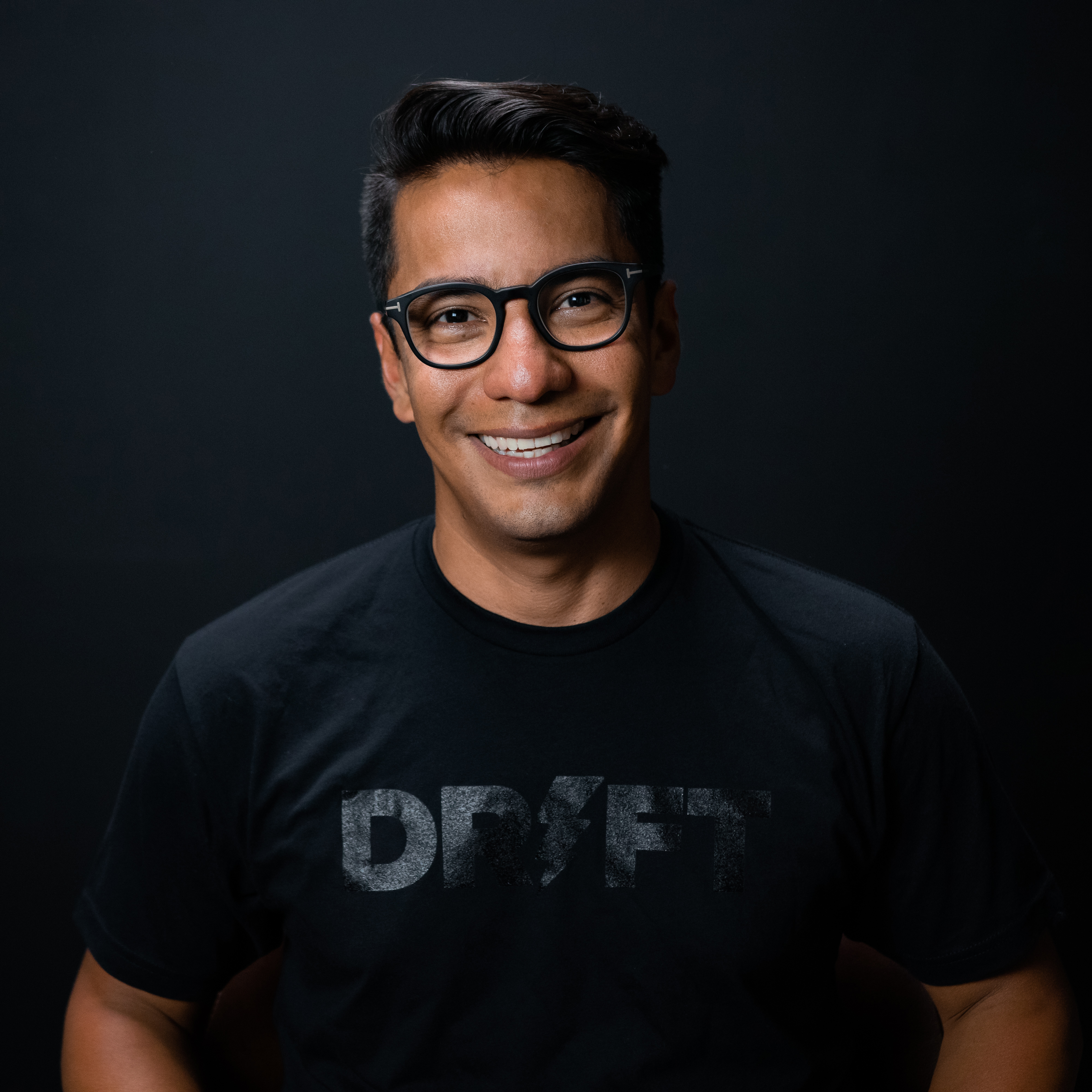
Elias Torres
Today's Guests
